Western Carolina University (21)
View all
- Canton Champion Fibre Company (2308)
- Cherokee Traditions (291)
- Civil War in Southern Appalachia (165)
- Craft Revival (1942)
- George Masa Collection (137)
- Great Smoky Mountains - A Park for America (3080)
- Highlights from Western Carolina University (422)
- Horace Kephart (973)
- Journeys Through Jackson (159)
- LGBTQIA+ Archive of Jackson County (89)
- Oral Histories of Western North Carolina (317)
- Picturing Appalachia (6617)
- Stories of Mountain Folk (413)
- Travel Western North Carolina (153)
- Western Carolina University Fine Art Museum Vitreograph Collection (129)
- Western Carolina University Herbarium (92)
- Western Carolina University: Making Memories (738)
- Western Carolina University Publications (2491)
- Western Carolina University Restricted Electronic Theses and Dissertations (146)
- Western North Carolina Regional Maps (71)
- World War II in Southern Appalachia (131)
University of North Carolina Asheville (6)
View all
- Allanstand Cottage Industries (62)
- Appalachian National Park Association (53)
- Bennett, Kelly, 1890-1974 (1463)
- Berry, Walter (76)
- Brasstown Carvers (40)
- Carver, George Washington, 1864?-1943 (26)
- Cathey, Joseph, 1803-1874 (1)
- Champion Fibre Company (233)
- Champion Paper and Fibre Company (297)
- Cherokee Indian Fair Association (16)
- Cherokee Language Program (22)
- Crowe, Amanda (40)
- Edmonston, Thomas Benton, 1842-1907 (7)
- Ensley, A. L. (Abraham Lincoln), 1865-1948 (275)
- Fromer, Irving Rhodes, 1913-1994 (70)
- George Butz (BFS 1907) (46)
- Goodrich, Frances Louisa (120)
- Grant, George Alexander, 1891-1964 (96)
- Heard, Marian Gladys (60)
- Kephart, Calvin, 1883-1969 (15)
- Kephart, Horace, 1862-1931 (313)
- Kephart, Laura, 1862-1954 (67)
- Laney, Gideon Thomas, 1889-1976 (439)
- Masa, George, 1881-1933 (61)
- McElhinney, William Julian, 1896-1953 (44)
- Niggli, Josephina, 1910-1983 (10)
- North Carolina Park Commission (105)
- Osborne, Kezia Stradley (9)
- Owens, Samuel Robert, 1918-1995 (11)
- Penland Weavers and Potters (36)
- Roberts, Vivienne (15)
- Roth, Albert, 1890-1974 (142)
- Schenck, Carl Alwin, 1868-1955 (1)
- Sherrill's Photography Studio (2565)
- Southern Highland Handicraft Guild (127)
- Southern Highlanders, Inc. (71)
- Stalcup, Jesse Bryson (46)
- Stearns, I. K. (213)
- Thompson, James Edward, 1880-1976 (226)
- United States. Indian Arts and Crafts Board (130)
- USFS (683)
- Vance, Zebulon Baird, 1830-1894 (1)
- Weaver, Zebulon, 1872-1948 (58)
- Western Carolina College (230)
- Western Carolina Teachers College (282)
- Western Carolina University (2008)
- Western Carolina University. Mountain Heritage Center (18)
- Whitman, Walt, 1819-1892 (10)
- Wilburn, Hiram Coleman, 1880-1967 (73)
- Williams, Isadora (3)
- Cain, Doreyl Ammons (0)
- Crittenden, Lorraine (0)
- Rhodes, Judy (0)
- Smith, Edward Clark (0)
- Appalachian Region, Southern (3032)
- Asheville (N.C.) (1945)
- Avery County (N.C.) (26)
- Blount County (Tenn.) (195)
- Buncombe County (N.C.) (1680)
- Cherokee County (N.C.) (283)
- Clay County (N.C.) (556)
- Graham County (N.C.) (238)
- Great Smoky Mountains National Park (N.C. and Tenn.) (525)
- Haywood County (N.C.) (3573)
- Henderson County (N.C.) (70)
- Jackson County (N.C.) (4924)
- Knox County (Tenn.) (35)
- Knoxville (Tenn.) (13)
- Lake Santeetlah (N.C.) (10)
- Macon County (N.C.) (421)
- Madison County (N.C.) (216)
- McDowell County (N.C.) (39)
- Mitchell County (N.C.) (135)
- Polk County (N.C.) (35)
- Qualla Boundary (982)
- Rutherford County (N.C.) (78)
- Swain County (N.C.) (2185)
- Transylvania County (N.C.) (270)
- Watauga County (N.C.) (12)
- Waynesville (N.C.) (86)
- Yancey County (N.C.) (72)
- Aerial Photographs (3)
- Aerial Views (60)
- Albums (books) (4)
- Articles (1)
- Artifacts (object Genre) (228)
- Bibliographies (1)
- Biography (general Genre) (2)
- Cards (information Artifacts) (38)
- Clippings (information Artifacts) (192)
- Copybooks (instructional Materials) (3)
- Crafts (art Genres) (622)
- Depictions (visual Works) (21)
- Design Drawings (1)
- Digital Moving Image Formats (2)
- Drawings (visual Works) (185)
- Envelopes (101)
- Exhibitions (events) (1)
- Facsimiles (reproductions) (1)
- Fiction (general Genre) (4)
- Financial Records (12)
- Fliers (printed Matter) (67)
- Glass Plate Negatives (381)
- Guidebooks (2)
- Internegatives (10)
- Interviews (822)
- Land Surveys (102)
- Letters (correspondence) (1045)
- Manuscripts (documents) (618)
- Maps (documents) (177)
- Memorandums (25)
- Minutes (administrative Records) (59)
- Negatives (photographs) (6090)
- Newsletters (1290)
- Newspapers (2)
- Notebooks (8)
- Occupation Currency (1)
- Paintings (visual Works) (1)
- Pen And Ink Drawings (1)
- Periodicals (194)
- Personal Narratives (10)
- Photographs (12977)
- Plans (maps) (1)
- Poetry (6)
- Portraits (4568)
- Postcards (329)
- Programs (documents) (181)
- Publications (documents) (2444)
- Questionnaires (65)
- Relief Prints (26)
- Sayings (literary Genre) (1)
- Scrapbooks (282)
- Sheet Music (2)
- Slides (photographs) (402)
- Songs (musical Compositions) (2)
- Sound Recordings (801)
- Specimens (92)
- Speeches (documents) (18)
- Tintypes (photographs) (8)
- Transcripts (328)
- Text Messages (0)
- A.L. Ensley Collection (275)
- Appalachian Industrial School Records (7)
- Appalachian National Park Association Records (336)
- Axley-Meroney Collection (2)
- Bayard Wootten Photograph Collection (20)
- Bethel Rural Community Organization Collection (7)
- Blumer Collection (5)
- C.W. Slagle Collection (20)
- Canton Area Historical Museum (2110)
- Carlos C. Campbell Collection (462)
- Cataloochee History Project (64)
- Cherokee Studies Collection (4)
- Daisy Dame Photograph Album (5)
- Daniel Boone VI Collection (1)
- Doris Ulmann Photograph Collection (112)
- Elizabeth H. Lasley Collection (1)
- Elizabeth Woolworth Szold Fleharty Collection (4)
- Frank Fry Collection (95)
- George Masa Collection (173)
- Gideon Laney Collection (452)
- Hazel Scarborough Collection (2)
- Hiram C. Wilburn Papers (28)
- Historic Photographs Collection (236)
- Horace Kephart Collection (861)
- Humbard Collection (33)
- Hunter and Weaver Families Collection (1)
- I. D. Blumenthal Collection (4)
- Isadora Williams Collection (4)
- Jesse Bryson Stalcup Collection (47)
- Jim Thompson Collection (224)
- John B. Battle Collection (7)
- John C. Campbell Folk School Records (80)
- John Parris Collection (6)
- Judaculla Rock project (2)
- Kelly Bennett Collection (1482)
- Love Family Papers (11)
- Major Wiley Parris Civil War Letters (3)
- Map Collection (12)
- McFee-Misemer Civil War Letters (34)
- Mountain Heritage Center Collection (4)
- Norburn - Robertson - Thomson Families Collection (44)
- Pauline Hood Collection (7)
- Pre-Guild Collection (2)
- Qualla Arts and Crafts Mutual Collection (12)
- R.A. Romanes Collection (681)
- Rosser H. Taylor Collection (1)
- Samuel Robert Owens Collection (94)
- Sara Madison Collection (144)
- Sherrill Studio Photo Collection (2558)
- Smoky Mountains Hiking Club Collection (616)
- Stories of Mountain Folk - Radio Programs (374)
- The Reporter, Western Carolina University (510)
- Venoy and Elizabeth Reed Collection (16)
- WCU Gender and Sexuality Oral History Project (36)
- WCU Mountain Heritage Center Oral Histories (25)
- WCU Oral History Collection - Mountain People, Mountain Lives (71)
- WCU Students Newspapers Collection (1923)
- Western North Carolina Tomorrow Black Oral History Project (69)
- William Williams Stringfield Collection (2)
- Zebulon Weaver Collection (109)
- African Americans (390)
- Appalachian Trail (35)
- Artisans (521)
- Cherokee art (84)
- Cherokee artists -- North Carolina (10)
- Cherokee language (21)
- Cherokee pottery (101)
- Cherokee women (208)
- Church buildings (190)
- Civilian Conservation Corps (U.S.) (111)
- College student newspapers and periodicals (2012)
- Dams (108)
- Dance (1023)
- Education (222)
- Floods (63)
- Folk music (1015)
- Forced removal, 1813-1903 (2)
- Forest conservation (220)
- Forests and forestry (1198)
- Gender nonconformity (4)
- Great Smoky Mountains National Park (N.C. and Tenn.) (181)
- Hunting (47)
- Landscape photography (25)
- Logging (122)
- Maps (83)
- Mines and mineral resources (9)
- North Carolina -- Maps (18)
- Paper industry (38)
- Postcards (255)
- Pottery (135)
- Railroad trains (72)
- Rural electrification -- North Carolina, Western (3)
- School integration -- Southern States (2)
- Segregation -- North Carolina, Western (5)
- Slavery (5)
- Sports (452)
- Storytelling (243)
- Waterfalls -- Great Smoky Mountains (N.C. and Tenn.) (66)
- Weaving -- Appalachian Region, Southern (280)
- Wood-carving -- Appalachian Region, Southern (328)
- World War, 1939-1945 (173)
Western Carolinian Volume 68 Number 05
Item
Item’s are ‘child’ level descriptions to ‘parent’ objects, (e.g. one page of a whole book).
-
-
STUDENT LIFE ALERT: Hepatitis A by emily weaver I WCnewsmagazine 2.0 Would you like a side of Hepatitis A with that tossed salad? That has been the case in a couple of restaurants in downtown Asheville lately. Fifteen people who have eaten at Doc Chey's Noodle House or the Laughing Seed Café, in Asheville, have contracted the Hepatitis A infection. According to Lynde Hedgpeth, a writer for the Asheville Citizen Times, both restaurants "voluntarily closed (after learning of the Hepatitis cases) to clean and replace food that may have been contaminated. " A dish washer at Doc Chey's and an employee at the Laughing Seed were infected with the disease at the time of the outbreak. However, health officials are investigating and believe that food distributors may be responsible for the contamination. According to a recent article in the Citizen Times, health officials say, "Prepackaged vegetables or salads, which often are not washed before being served, could have led to the liver disease in 15 people here and at least 170 in Georgia who contracted the illness in September." All employees at Doc Chey's and the Laughing Seed have received shots o immune globulin to further prevent the spread of infection. Many other Asheville restaurant owners have paid or offered to pay for vaccination shots for their employees. According to research conducted by Leslie Boyd, a staff writer for the Citizen Times, each vaccine costs $57 for two doses given 6 months apart. To prevent the spread of diseases such as Hepatitis A, E-coli, and salmonella, restaurants are required to follow certain health and safety guidelines. One of the most important of these guidelines is for employees to wash their hands after any breaks or trips to the restroom. The Center for Disease Control's web site states, "the Hepatitis A virus (HAV) is usually spread from person to person by putting something in the mouth (even though it may look clean) that has been contaminated with the stool of a person with Hepatitis A." Symptoms, which may last 3 to 10 days and reoccur up to 6 to 9 months after contraction, include: fever, diarrhea, fatigue, nausea, abdominal pain, loss of appetite, and jaundice (a liver affliction that results in yellowing of the skin). According to the Center for Disease Control, there is no long-term infection and once a person has had it they cannot be infected a second time. The Buncombe County Health Department has given thousands of free vaccination shots to people who have eaten at Doc Chey's and the Laughing Seed Café restaurants before September 21. If you have eaten or known anyone who has eaten at either restaurant during the month of September you are urged to get a vaccination shot from the local health department. HEALTH NOTES UNIVERSITY HEALTH SERVICES Q&A Q - Should students be concerned with the recent outbreaks of Hep A in the Asheville area? A - The only reason someone should be concerned is if they ate at the restaurants in Asheville (Doc Chey's or the Laughing Seed) or has had close contact with someone who has Hep. A. Q - What should students know about the illness? A - Hep A is a virus that presents with flu-like symptoms (fever, body aches, chills). Individuals may also have brown colored urine and a yellow discoloration of the skin. Hep A effects the liver and can cause long-term damage to the liver if undetected and untreated. There is a vaccine that can prevent Hep A. It is a series of two shots much like the HEP B vaccines. This vaccine is availble at the Health Center and is also available at Jackson County Health dept. Q - How is Hep A spread? hep A is spread through bodily fluids (urine, feces, serum etc.). If a person is infected with Hep A, and does not wash his/her hands, the virus can be spread through food preparations etc.(as in the case at the restaurants in Ash) A - What types of precautions should students take? Wash hands thoroughly after bathroom visits, practice good hygiene, and always practice safe sex (ie condoms) What is hepatitis A? Hepatitis A is a liver disease caused by hepatitis A virus. How is hepatitis A virus transmitted? Hepatitis A virus is spread from person to person by putting something in the mouth that has been contaminated with the stool of a person with hepatitis A. This type of transmission is called "fecal-oral." For this reason, the virus is more easily spread in areas where there are poor sanitary conditions or where good personal hygiene is not observed. Most infections result from contact with a household member or sex partner who has hepatitis A. Casual contact, as in the usual office, factory, or school setting, does not spread the virus. What are the signs and symptoms of hepatitis A? Persons with hepatitis A virus infection may not have any signs or symptoms of the disease. Older persons are more likely to have symptoms than children. •If symptoms are present, they usually occur abruptly and may include fever, tiredness, loss of appetite, nausea, abdominal discomfort, dark urine, and jaundice (yellowing of the skin and eyes). Symptoms usually last less than _2 months; a few persons are ill for as long as 6 months. The average incubation period for hepatitis A is 28 days (range: 15—50 days). How do you know if you have hepatitis A? A blood test (IgM anti-HAV) is needed to diagnose hepatitis A. Talk to your doctor or someone from your local health department if you suspect that you have been exposed to hepatitis A or any type of viral hepatitis. How can you prevent hepatitis A? Always wash your hands after using the bathroom, changing a diaper, or before preparing or eating food. Two products are used to prevent hepatitis A virus infection: immune globulin and hepatitis A vaccine. Immune globulin is a preparation of antibodies that can be given before exposure for short-term protection against hepatitis A and for persons who have already been exposed to hepatitis A virus. Immune globulin must be given within 2 weeks after exposure to hepatitis A virus for maximum protection. Hepatitis A vaccine has been licensed in the United States for use in persons 2 years of age and older. The vaccine is recommended (before exposure to hepatitis A virus) for persons who are more likely to get hepatitis A virus infection or are more likely to get seriously ill if they do get hepatitis A. The vaccines currently licensed in the United States are HAVRIX@ (manufactured by GlaxoSmithKline) and VAQTA@ (manufactured by Merck & Co., Inc), (SOURCE: http://www.cdc.gov/ncidod/diseases/hepatitis/a/faqa.htm#gen) Can you get hepatitis A from food or water? In addition to getting hepatitis A directly from infected people, you can get hepatitis A by: eating fruits, vegetables, or other food that may have become contaminated during handling eating raw shellfish harvested from sewage contaminated water swallowing contaminated water or ice.
Object
Object’s are ‘parent’ level descriptions to ‘children’ items, (e.g. a book with pages).
-
The Western Carolinian is Western Carolina University's student-run newspaper. The paper was published as the Cullowhee Yodel from 1924 to 1931 before changing its name to The Western Carolinian in 1933.
-
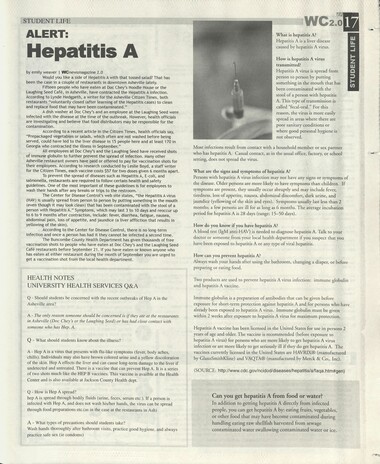




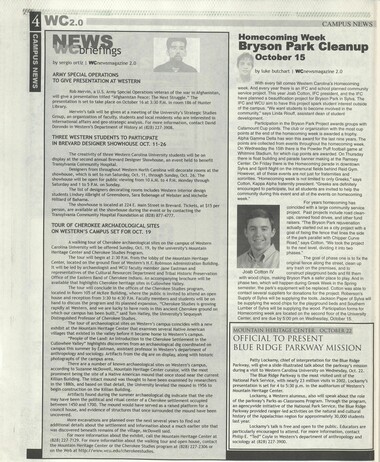








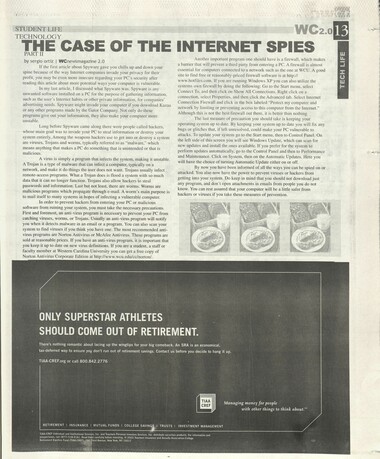

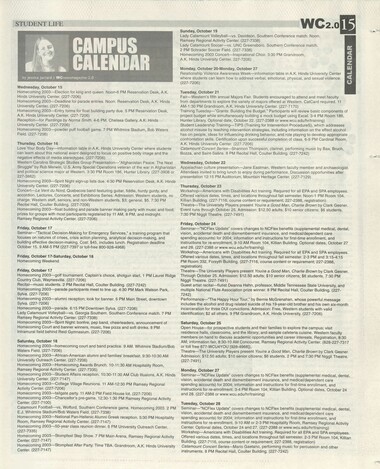

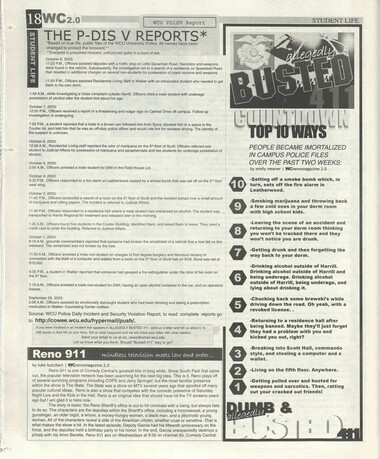
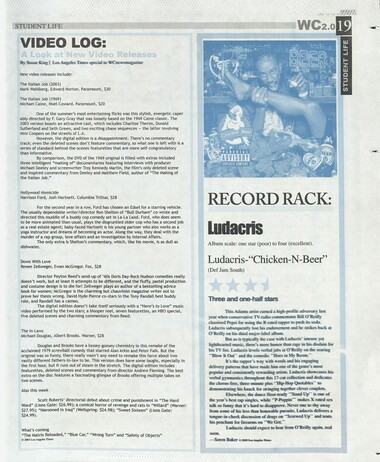









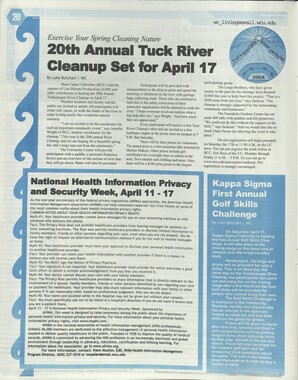






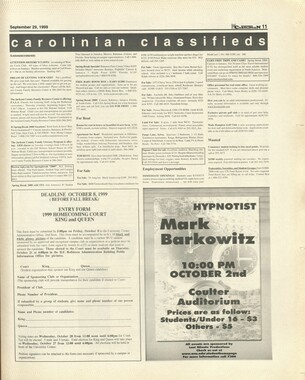



































![hl_westerncarolinian_2004_[vol69_no03]_07.jpg](/media/w400h300/wcu_publications/hl_westerncarolinian_2004_[vol69_no03]_07.jpg)



















